Let this adapted sermon from Jonah 2 encourage you to repent of self-righteousness so you can truly follow God’s heart for the nations.
In my post on Jonah 1, we found out how Jonah got inside of the fish. Verse 17 tells us, “But the Lord provided a great fish to swallow Jonah” — we don’t know if it was a whale, but most great fish are whales — “and Jonah was inside the fish three days and three nights.”
Now, I believe in miracles, but this sounds like a whale of a tale if you ask me! If you’re a skeptic, I’d like to offer some evidence from outside of the Bible.
A Whale of a Tale?
Strange things can happen when you are in the water. On November 4, 2020, someone actually caught on camera a man being nearly swallowed by a whale near Avila Beach, California. It was only momentarily, and he didn’t make it past the mouth… but still.

In a separate incident, we have video testimony of a lobster fisherman/diver on June 11, 2021, off of Cape Cod, Massachusetts, who actually did get swallowed by a whale for… well, more than a few seconds.
He said after the encounter:
I do this basically, May, June and July, and… just a normal day today, I was on my second dive and I jumped in the water and I was heading down towards the bottom, in about 45 feet of water. I was just about at the bottom and I just felt this truck hit me and everything just went dark and I could just feel just, just some hard stuff all around me like, and I just thought, did I just get eaten by a white shark? And, and then I said, no, I don’t feel any teeth. And I said, oh my God, I’m in the mouth of a whale!
He explains that he was in the mouth of the whale for about 30 or 40 seconds before the whale spit him out. It sounded terrifying — his life must have flashed before his eyes. Can you imagine? And there was a witness who saw it happen.
If something like that can happen at random, how much more, with God’s intervention, could Jonah get swallowed by a whale?
Chapter 2 begins with Jonah in the belly of the fish. In that strange and uncomfortable place, he offers a poem of thanksgiving, reflecting on his status and at least his physical salvation.
Jonah 2 (NIV, 1984)
“From inside the fish Jonah prayed to the Lord his God. He said:”
In my distress I called to the Lord,
and he answered me.
From the depths of the grave I called for help,
and you listened to my cry.
You hurled me into the deep,
into the very heart of the seas,
and the currents swirled about me;
all your waves and breakers
swept over me.
I said, ‘I have been banished
from your sight;
yet I will look again
toward your holy temple.’
The engulfing waters threatened me,
the deep surrounded me;
seaweed was wrapped around my head.
To the roots of the mountains I sank down;
the earth beneath barred me in forever.
But you brought my life up from the pit,
O Lord my God.
When my life was ebbing away,
I remembered you, Lord,
and my prayer rose to you,
to your holy temple.
Those who cling to worthless idols
forfeit the grace that could be theirs.
But I, with a song of thanksgiving,
will sacrifice to you.
What I have vowed I will make good.
Salvation comes from the Lord.
“And the Lord commanded the fish, and it vomited Jonah onto dry land.”
On the Surface
Jonah is very grateful that God saved him from the stormy seas and from death. It seems like a very genuine and theologically accurate prayer, doesn’t it?
In terms of posture, he gives glory to God. In terms of theology, he emphasizes the sovereignty of God. He probably would have gotten an A plus in rabbi school for so clearly articulating his low position and for committing to worship God and make good on the promises he’s made.
In terms of literary style, Jonah uses a double chiasm — for those who know what that is. For everyone else, let’s just say he would have gotten an A plus in language class for this beautiful poem. He probably would have even gotten a hearty “Amen!” when he presented it at the temple, too. The truth is, I’m a little surprised it didn’t end up in the Psalms.
But then again — things are not always as they appear.
A Deeper Look
I love walking around my neighborhood because I get to see the birds — mostly blue jays and cardinals and robins. Although I’ve seen blue jays throughout my whole life, I recently learned something surprising. Did you know that their feathers are not actually blue?
Their feathers are not blue due to pigmentation, but rather to how light reflects off of them. If you take a blue jay’s feather and put the light source behind it so that it’s backlit, it’s actually black.

Look at them side by side. The feather that appears to be a beautiful blue color is actually black — it is not as it appears at first.
Similarly, Jonah’s poem appears one way, but if you look at it in different lighting, it reveals something else. I believe that Jonah’s poem reveals not that he is spiritual, but that he is secretly self-righteous.
Shedding New Light on Jonah’s Prayer
Let me give a little bit of background first; after that, we’ll reread Jonah’s psalm with a new set of lenses.
We talked about 2 Kings 14:23 in the Jonah 1 teaching: “In the fifteenth year of Amaziah son of Joash king of Judah, Jeroboam [also known as Jeroboam II], son of Jehoash king of Israel became king in Samaria [the capital of the northern 10 tribes], and he reigned for 41 years.”
Verse 25 says that Jeroboam II “was the one who restored the boundaries of Israel from Lebo Hamath to the Sea of the Arabah in accordance with the word of the Lord, the God of Israel, spoken through his servant Jonah son of Amittai, the prophet from Gath Hepher.”
This guy’s whole ministry was predicated upon military and political expansion and success. Israel moved from the darker blue area on the map below up to Aram, the orange area. It was an incredibly successful time.

We skipped verse 24, which gives an important insight into the character of Jeroboam II. It says that he “did evil in the eyes of the Lord and did not turn away from any of the sins of Jeroboam son of Nebat, which he had caused Israel to commit.”
Let’s look at Jonah’s poem again.
While it sounds great on the surface, it’s actually dripping with self-righteousness and pride.
Jonah 2:2: “In my distress I called to the Lord, and he answered me. From the depths of the grave I called for help, and you listened to my cry.”
Oh, a prayer warrior, are you? Funny thing, this is the first time you’ve prayed in the whole story.
Jonah, what about when God called you? You were silent and merely ran.
What about when the sailors, the pagans who already prayed, called you to pray and you didn’t? Jonah, what about when the lot fell to you? It was your last chance, but you didn’t even pray then. Oh, but now you’re praying. Very spiritual, aren’t you?
Verse 3: “You hurled me into the deep, into the very heart of the seas, and the currents swirled about me; all your waves and breakers swept over me.”
Oh, now you blame God. God hurled you into the deep? You’re the one who ran! You caused the storm. Sure, God sent it, but it’s your fault.
Verse 4: “I have been banished from your sight; yet I will look again toward your holy temple.”
That’s funny, Jonah 1 says you ran from the presence of the Lord.
Verse 5: “The engulfing waters threatened me, the deep surrounded me; seaweed was wrapped around my head.”
Now you’re playing the victim.
Verse 6: “To the roots of the mountains I sank down; the earth beneath barred me in forever. But you brought my life up from the pit, O Lord my God.”
The earth barred you? Again, this is all the pit that you dug yourself.
Verse 7: “When my life was ebbing away, I remembered you, Lord, and my prayer rose to you, to your holy temple.
Oh, now you’re a good guy, Jonah; I see.
Verse 8: “Those who cling to worthless idols forfeit the grace that could be theirs.”
And everyone else is the bad guy.
Verse 9: “But I, with a song of thanksgiving, will sacrifice to you. What I have vowed I will make good. Salvation comes from the Lord.”
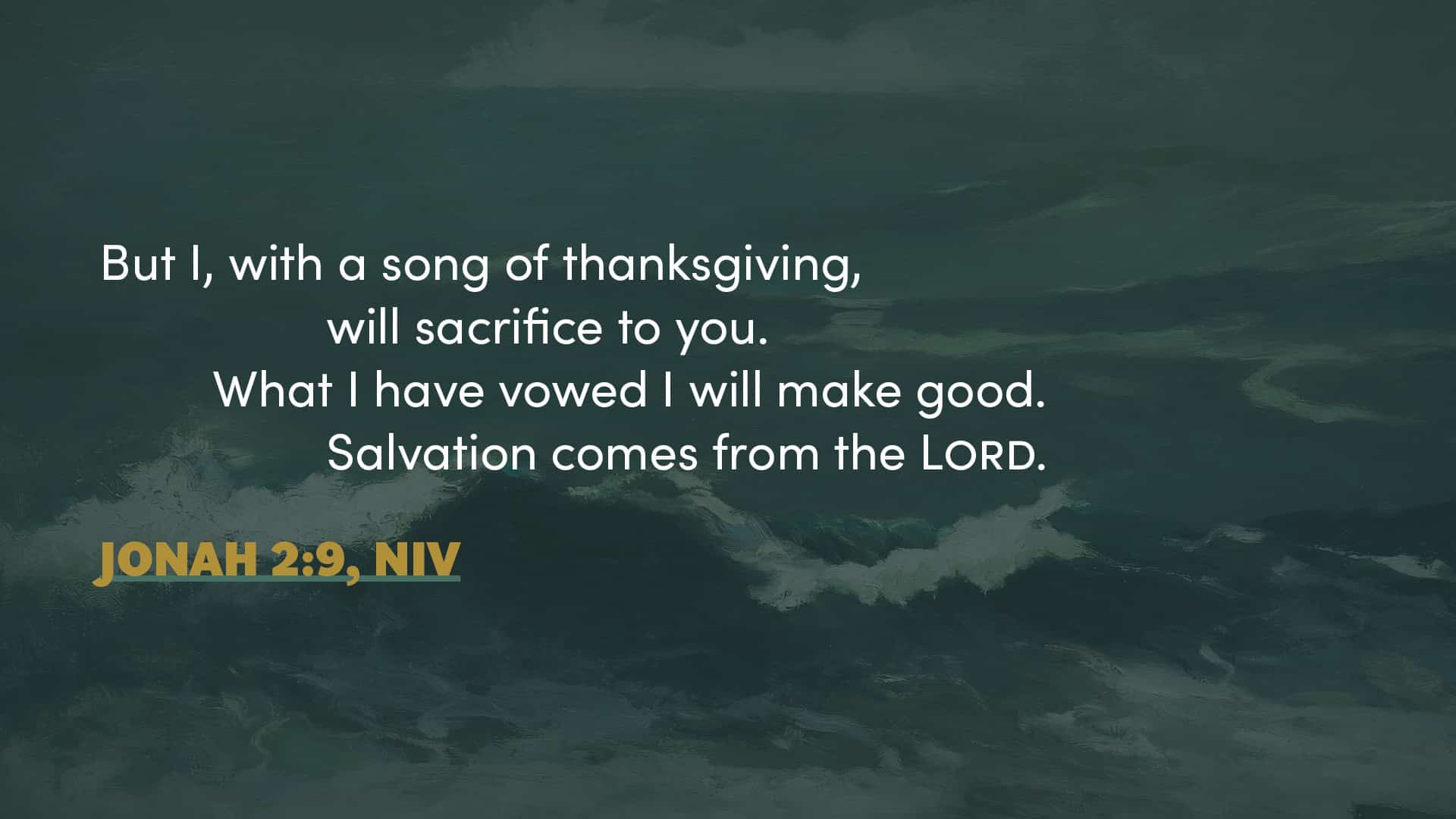
“Salvation comes from the Lord.”
Jonah makes God out to be the hero of his story. But the truth is that, in his heart — as we will see in Jonah chapters three and four — Jonah is the real hero of his story. You will see this if you pay attention not only to what he says, but also what he does not say.
Pride can be cloaked in spirituality.
But if you have ears to hear what is not said, it’s equally revealing.
Jonah does not say “I’m sorry.” You would think the prophet who became the renegade would at least say, “I’m sorry for running from you.” He doesn’t use the word repent. He doesn’t say, “I repent for neglecting my call to the nations.” He doesn’t say anything like that.
Verse 10: “And the Lord commanded the fish, and it vomited Jonah on to dry land.”
I don’t think that God sent the fish because he approved of Jonah’s prayer, but because he was putting up with him. Although it was a beautiful prayer, Jonah was lacking repentance for his self-righteousness and exclusivity.
Self-Righteous Israel
Remember what Israel was doing at the time? Evil. King Jeroboam did evil. And Jonah was the champion for people who are full of wickedness: successful on the outside (that is, saved from the whale), but self-righteous in his own heart. Whoa.
Jonah kept up a good appearance, but he was missing true humility.
With self-righteousness, it’s often more about what we don’t do. You never hear a self-righteous person apologize. They act like they never do anything wrong, even though we all know they do. But it doesn’t seem like they’re very self-aware. Here’s the deal:
It is 100% possible to be living in total prosperity and success while still living in sin.
Jeroboam II, the prophet Jonah, and the people at this time were doing exactly that. Jonah represented the people of Israel to the T in that moment.
We could be doing this too. A country can be living in prosperity but also living in sin. A church could be adding services, planting other churches, expanding their brand, yet also be living in sin.
Outwardly successful, inwardly sinful. A family could be adding children, doing ministry, leading groups, but inwardly living in sin. A person could be charismatic and convincing, but inwardly full of sin.
Just because there is outward success doesn’t mean the Lord is blessing you because of your righteousness.
Yet, it might appear that way.
If both Jonah and Israel were truly repentant, they would not only remember God’s sovereignty, but also His heart for the nations. Even as Jonah vowed he would pray toward the temple again, he might have remembered how Solomon declared at the dedication ceremony that the temple was for the nations, not just for one ethnic group. Solomon raised his hands in front of all Israel and said:
As for the foreigner who does not belong to your people Israel but has come from a distant land because of your name — for men will hear of your great name and your mighty hand and your outstretched arm — when he comes and prays toward this temple, then hear from heaven, your dwelling place, and do whatever the foreigner asks of you, so that all the peoples of the earth may know your name and fear you, as do your own people Israel, and may know that this house I have built bears your Name. (1 Kings 8:41-43)
Maybe Jonah didn’t remember that prayer or the heart of God because he didn’t like that aspect of God’s character. He liked the life he had built; he liked the kingdom that Israel had advanced. He — a prophet of God — forgot about God.
Jonah was essentially saying, Salvation comes from the Lord, but it completes with me. God saves me; yeah, that’s his doing. But he saves me because I’m me; I’m part of Israel. I’m its prophet. Jonah’s pride and self-righteousness are the sneakiest because they’re cloaked in spirituality.
Hidden Idolatry?
Jonah’s problem was that he thought he was more spiritual than he was. And in the worst way. He assumed, as verse 8 makes clear, that “those” people have idols. Those pagans on the ship that just threw me into the ocean, they cling to idols — but not me. Those Ninevites, they cling to idols — but not me.
An idol is anything that we put on the throne instead of God.
Now, some things are truly important. Health is very important. I got this new thing on my wrist called WHOOP. It gives me data on how well I slept and what my heart rate is when I work out. But health is not God.
Country is very important. Look, I’ve got two; I’m a dual citizen. All of North America is a place I can currently live. But your country is not God.
Our religious obedience and dedication are good, but those are not God either.
I’ve already hinted at the fact that I’m Canadian. One of my favorite things is a good old hockey game. I’ve played hockey for a solid 14 years of my life. I love me some hockey. I went to game six of the Stanley Cup finals. I mean, come on!
It’s funny how we can take something so innocent and cling to it. Our idols can be sneaky. Just recently I attended a Phil Wickham and Brandon Lake concert at the stadium where the Nashville Predators play.
In that place, I couldn’t help but think about all the hockey games I’ve seen there, how the crowd shouts meaningless taunts about the goalie with hands raised and emotions involved — all about something as stupid as a rubber disc going in a cloth net. I mean, “Put the biscuit in the basket” — is that as good as it gets?
Definitely not. How do I know this?
We worshiped in that very same place.
The same hands were raised high (see the right side), but with a completely different object of worship. (see the left). Idols can be sneaky. I’m not saying everyone who goes to a hockey game worships idols, but the similarities of these scenes is striking and worth thinking about.
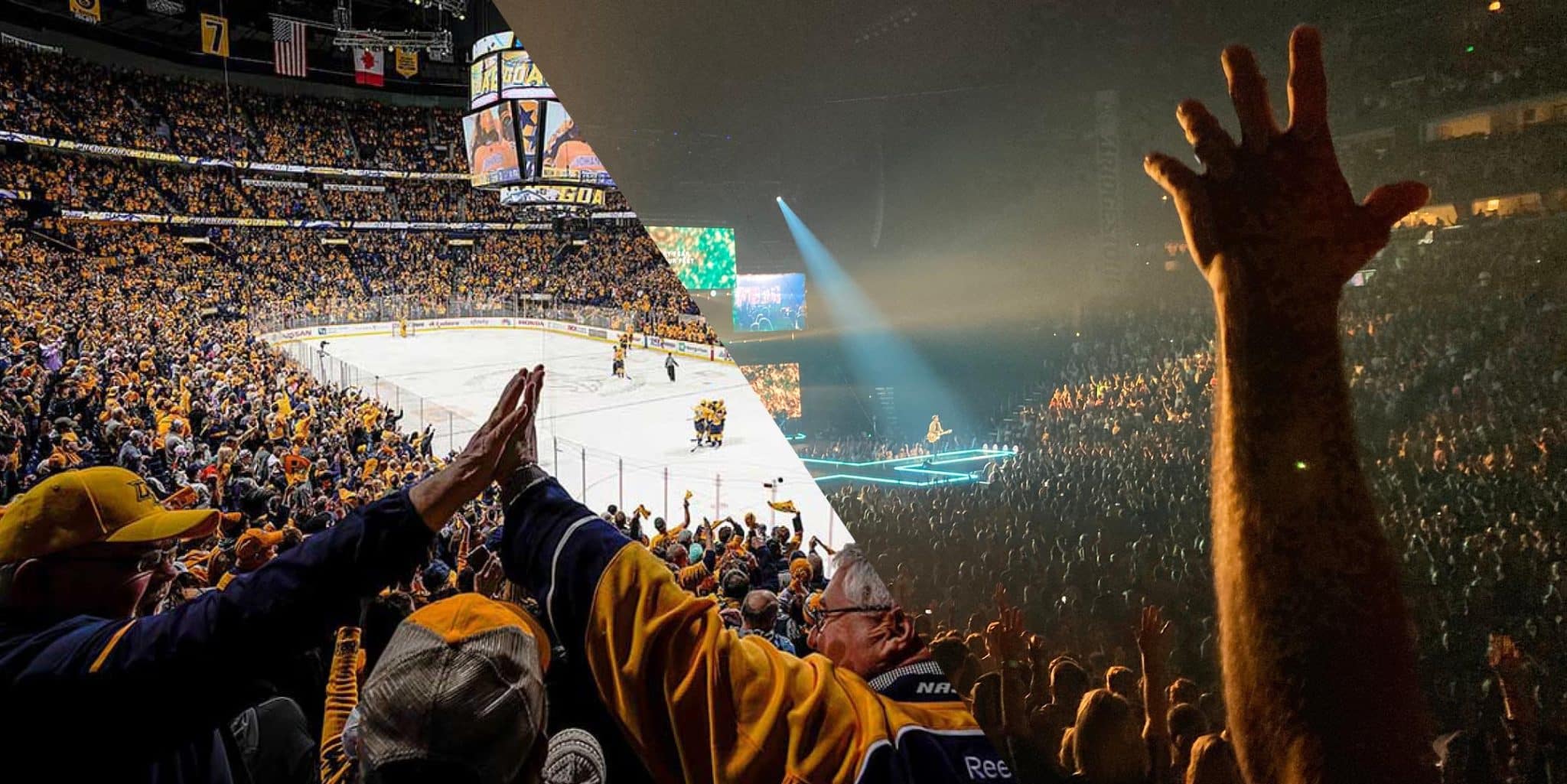
What’s your idol now? What has taken the place of God in your life so that the hands that once worshiped now cling to emptiness? See, the funny thing about idols is that they don’t deliver.
Jonah’s Theology
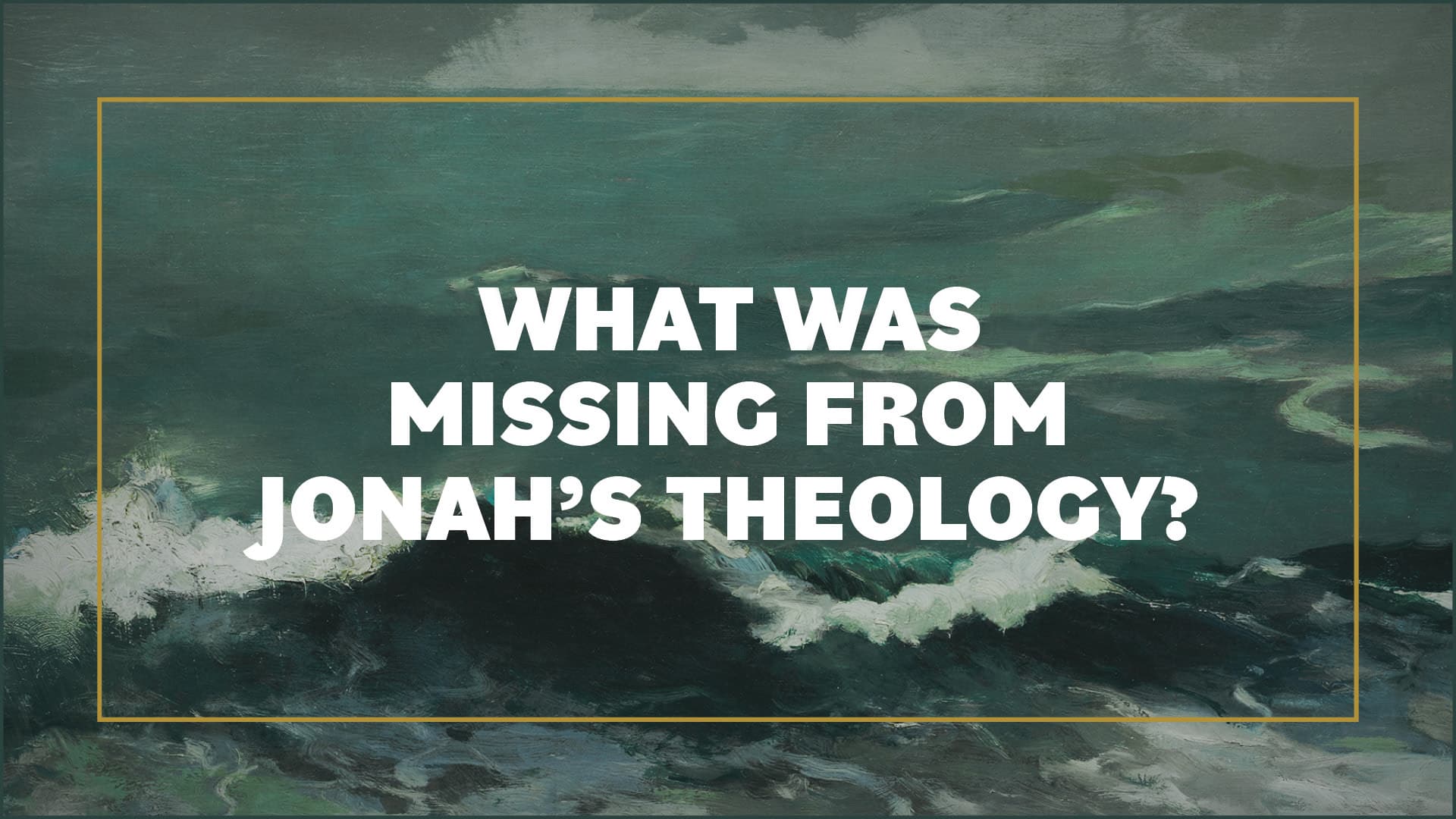
Theology is really important because it’s what we think about God.
What would Jonah’s prayer have sounded like if his heart was in the right place? In terms of posture, I think he’d still give glory to God. But beyond that, he would also say that he had not lived up to God’s standard, in terms of his theology.
I think he would still emphasize the sovereignty of God, but he would also mention his depravity in light of that. I think he would have repented and said “I’m sorry.” I think he would have emphasized not just that he vowed to make good on the promises he’d made, but that God is the only possible reason he could even do that.
Jonah’s prayer would have been just as stylistic. But the theology, the content, the substance would have changed. He would have been humble. He would have still said “Salvation comes from the Lord,” but he would have added, “and it’s for all who bear his image.” He would have said, “You brought my life up from the pit, oh Lord, and you want to do that for all people.”
In this scene, Jonah was half converted to God’s heart.
His body was ready, but his heart was still far. And if he had been in the right place, I think he would have said, “Salvation comes from the Lord for all, including me — and it completes in the Lord.”
Overcoming Self-Righteousness
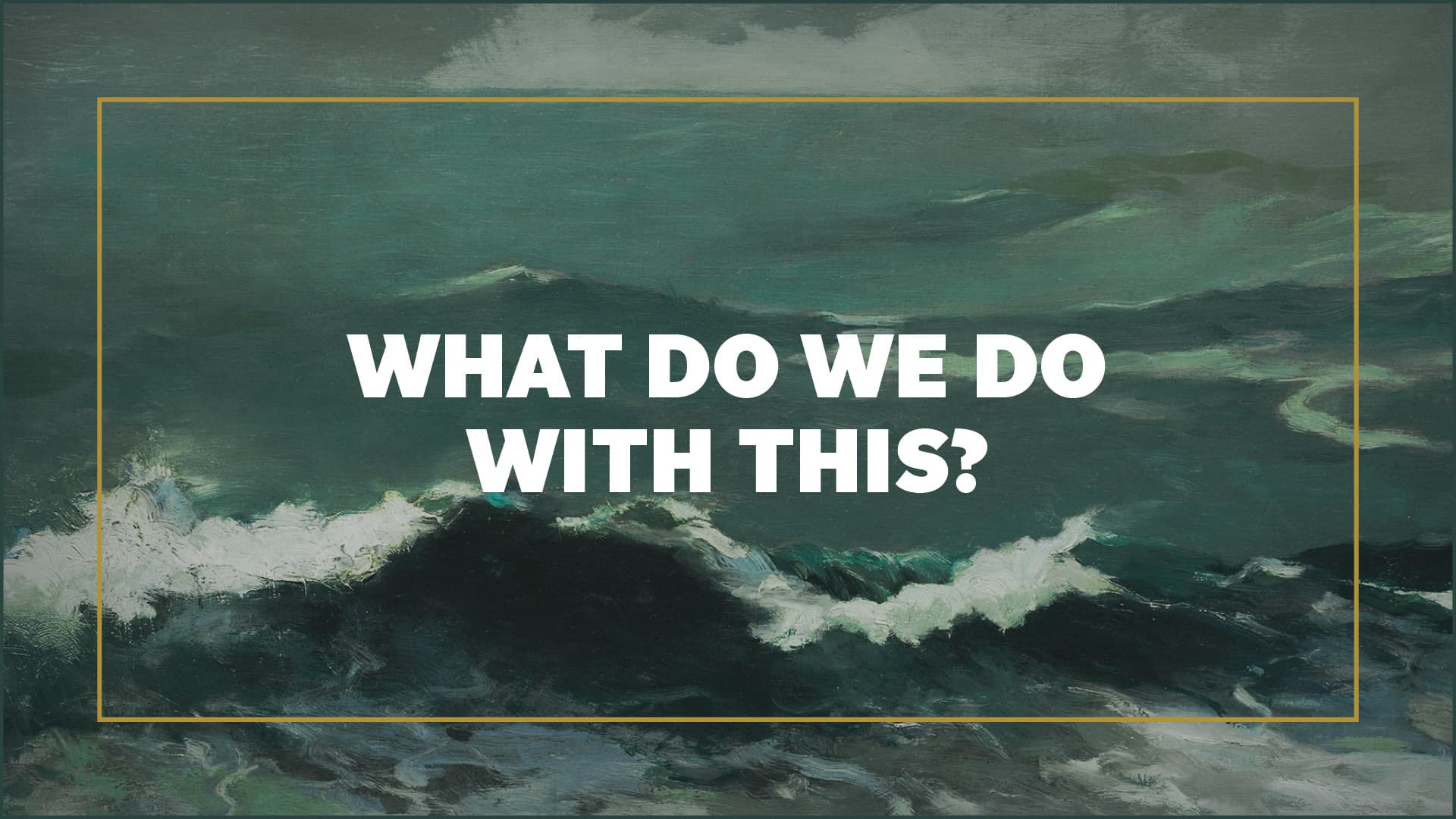
Self-righteousness gets in the way not only of our own ultimate salvation but also of those to whom we can minister. It doesn’t quite work to convert people when you’re full of yourself; I know that by experience.
1. Recognize that you’ve got a challenge.
This is a tough one. How do you know if you struggle with this? You don’t really confess? You kind of do, but only when you get caught? Or… ? The deeper problem is, you’re not actively aware. You never really admit when you’re wrong. When you make a mistake or apologize, the words “I’m sorry” don’t come easily to you. We tend to blame other people, and sometimes even God. And even when we tell our God stories, we make ourselves out to be the hero. We are the pivot point; we are the crux of the change because we prayed to God at the right time.
We can mask our spirituality with pithy sayings and platitudes just like Jonah did and yet still be full of it. Still be full of self-righteousness. This hit me pretty hard. And it’s is not the first time I’ve been hit hard with this message.
One example: In October 2004, the National Missionary Convention (now called ICOM) was being held in Peoria, Illinois. Everyone at Ozark Christian College was going. I liked missions, so I went. Dean Trune, a Restoration Movement minister, preached a message about pride I still remember to this day, almost 20 years later.
He said that you can be prideful and pray, but one sure sign of pride is prayerlessness.
When was the last time you connected with the Lord for longer than three minutes?
Prayerlessness is a symptom of self-righteousness. You are saying that you don’t need God.
2. Repent.
Please consider your heart and repent of any self-righteousness. God is so gracious — he sees our selfish plight and he still will hold out hope for people like you and me. Jesus talks about this kind of scenario in Luke 18:9-13:
To some who were confident of their own righteousness and looked down on everybody else, Jesus told this parable: “Two men went up to the temple to pray, one a Pharisee and the other a tax collector. The Pharisee stood up and prayed about himself: ‘God, I thank you that I am not like other men—robbers, evildoers, adulterers—or even like this tax collector. I fast twice a week and give a tenth of all I get.’ But the tax collector stood at a distance. He would not even look up to heaven, but beat his breast and said, ‘God, have mercy on me, a sinner.’ I tell you that this man, rather than the other, went home justified before God. For everyone who exalts himself will be humbled, and he who humbles himself will be exalted.”
Where do you see yourself in that story? Are you in the back there with the tax collector? Beating your breast, saying “I’m not even worthy”? Or are you pretty good? Most of us can benefit from sincerely speaking this prayer:
“Lord Jesus Christ, Son of God, have mercy on me, a sinner.”
It’s a prayer through the ages. May it be the prayer of our hearts when we struggle in the way that Jonah struggled.
3. Normalize repentance.
Let’s practice repentance as a spiritual discipline to train our hearts. Don’t just confess when you get saved from the whale. Confess today and tomorrow and the next day and the day after, when you’re alone with God.
Let’s be people who easily confess our failures because we’re on the same footing before the cross. Let’s normalize repentance with our church family, small groups, best friends, our children, and with our spouse. It’s not easy, but let’s make it easy by God’s grace.
I want to leave us with this:
Repent of self-righteousness.
This is hard to say because I’ve been there a lot. But we might as well all come on board, because you can’t hide that from the Lord. Everyone else sees it, too.
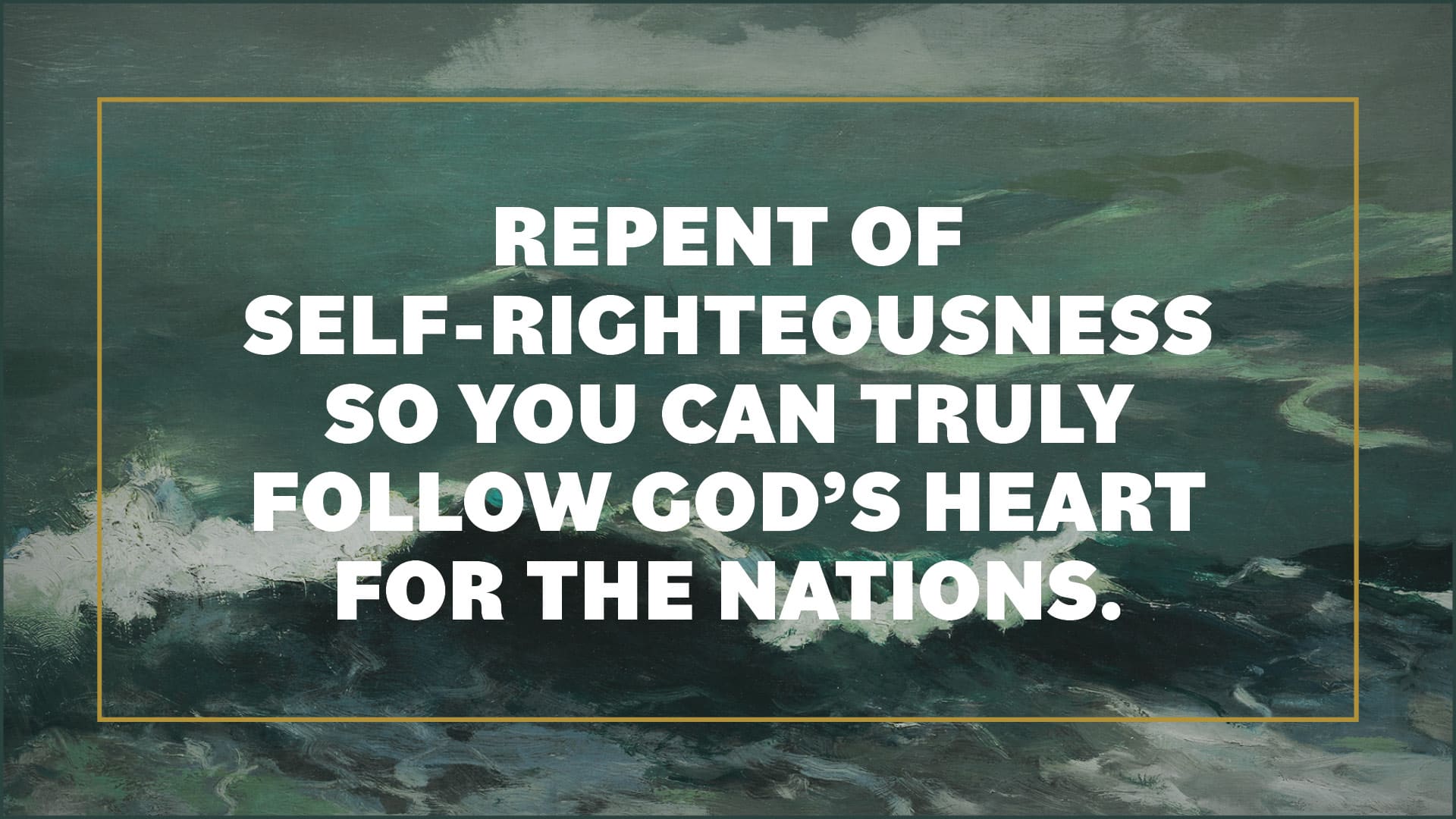
Clear the Way for God’s Progress in Your Life
Whatever your life looks like on the outside, the real progress of the heart is when you know and trust in Jesus for your salvation — not just at church but also in the ministry of your life. When you don’t simply pray about God’s sovereignty or mention your depravity, but you believe it to the point of beating your chest:
God have mercy on me, a sinner.
It doesn’t matter what anyone else is like because before you, I am the sinner that you have saved by grace.
Be free to be your broken self at the heart level. It is a burden to run like Jonah, but we don’t have to in Christ! He doesn’t need us to be righteous in ourselves; he just needs us to surrender. This is your opportunity to repent, to turn the other way — not just with your body, but with your heart.
Subscribe to HIM Publications here to get long-form discipleship content delivered to your inbox each week.
